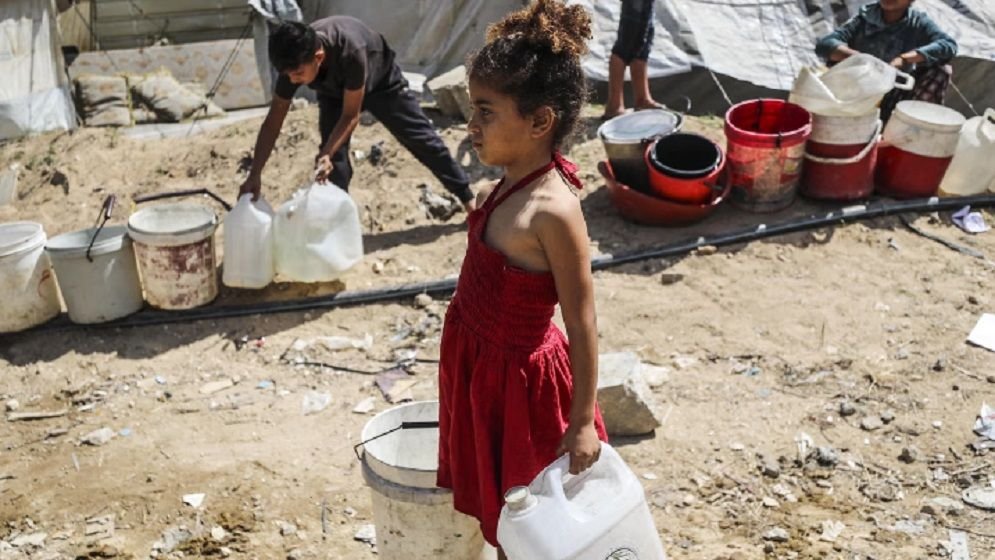Gaza Water Shortage Reaches Critical Levels
The humanitarian situation in Gaza has reached a breaking point as residents struggle to access clean drinking water amid an ongoing Israeli offensive. With fuel supplies blocked and aid deliveries severely restricted, the United Nations has warned that Gaza’s water supply could collapse entirely by the end of this week if immediate action is not taken. The Gaza water crisis has forced families to resort to desperate measures, including giving children salty, contaminated water, leading to severe health consequences.
According to reports from Gaza residents, many have no choice but to make their children drink salt water due to the extreme scarcity of clean water. Medical professionals in the region have observed a sharp rise in kidney problems, stomach aches, and diarrhea among the population, particularly in children. Raed al-Jaharneh, a Palestinian living in Gaza, described the unbearable conditions, explaining that while the salty water causes illness, there are simply no alternatives available.
Earlier this month, Jonathan Creeks, a UNICEF official, visited a water treatment plant in southern Gaza and found that water production had plummeted by 80% due to power shortages. The lack of electricity has crippled essential infrastructure, and without fuel, even the limited water that can be produced cannot be transported effectively. The Gaza water crisis is further exacerbated by Israel’s blockade, which has restricted fuel imports, leaving water trucks unable to operate and leaving thousands without access to safe drinking water.
Although Israel recently permitted a limited number of aid trucks to enter Gaza after an 11-week blockade, the supplies fall far short of what is needed. The UN managed to send 90 trucks filled with medical supplies, flour, and nutritional food, but humanitarian agencies estimate that at least 500 trucks per day are required to meet the basic needs of Gaza’s population. Jens Lark, a spokesperson for the UN Office for the Coordination of Humanitarian Affairs (OCHA), highlighted the challenges in delivering aid, citing security risks, looting, and poor coordination with Israeli authorities as major obstacles.
Despite allowing some aid, Israel continues to block fuel shipments, which are critical for maintaining water and sanitation systems. OCHA has warned that without fuel, Gaza’s water supply could completely shut down, particularly in the northern regions where fuel reserves have already been exhausted. The Gaza water crisis has left entire communities without access to clean water, increasing the risk of disease and further suffering among civilians.
Meanwhile, Israel’s military offensive shows no signs of stopping. Since October 2023, Gaza has endured relentless attacks, with the latest escalation under “Operation Gideon’s Chariots” intensifying the violence. On Thursday alone, 51 people were killed, bringing the total death toll to 53,655 over 19 months. Israeli forces have also issued evacuation orders for multiple areas in northern Gaza, displacing thousands more residents already struggling to survive.
In a related development, Israeli Prime Minister Benjamin Netanyahu claimed that Hamas leader Mohammed Sinwar was killed last week, though no independent verification has been provided. The announcement comes amid heightened tensions, including an attack on Israeli embassy workers in Washington, D.C., prompting Netanyahu to increase security at diplomatic missions worldwide.
International condemnation has grown over Israel’s actions, particularly after troops fired warning shots at foreign diplomats visiting Jenin in the occupied West Bank. The European Union’s foreign policy chief, Kaza Kalas, called for accountability, while the UN and other nations have denounced the incident.
US Secretary of State Marco Rubio expressed hope for a swift resolution to the conflict, stating that he hopes for a breakthrough in Gaza that would end the war and secure the release of hostages. However, with the Gaza water crisis deepening and humanitarian conditions worsening, the immediate focus remains on ensuring lifesaving aid reaches those in desperate need before it’s too late.
Go To Main Page

